Article 56: Coffee and the national spirit of the Japanese
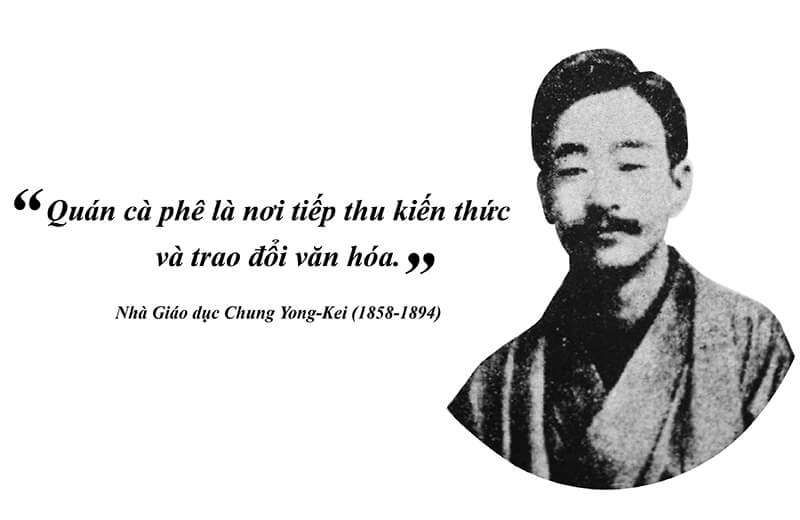
“Coffee shops are places to acquire knowledge and exchange cultures” Educator Chung Yong-Kei (1858 – 1894)
Japan is famous for its tea ceremony, but it is also the world’s leading coffee consumer. For hundreds of years, coffee has influenced the learning encouragement process, revitalizing the “national spirit” of Japan.
Cultivating civilization, changing heavenly destiny
In the book An Encouragement of Learning, Fukuzawa Yukichi stated that the “soul” of civilization is the will and spirit of the people. And in the real situation that Japan had only Japanese people but no Japanese nationalists, civilization was essential to open up opportunities for Japan.
From the era of Tokugawa reform – the second half of the Edo period, Japan had a profound change in cultural values, shaping individual lifestyles and behaviors by following the hierarchical principles of community ethics. This was the impetus for the formation of national consciousness and spirit, preparing for the flourishing path of Japan.
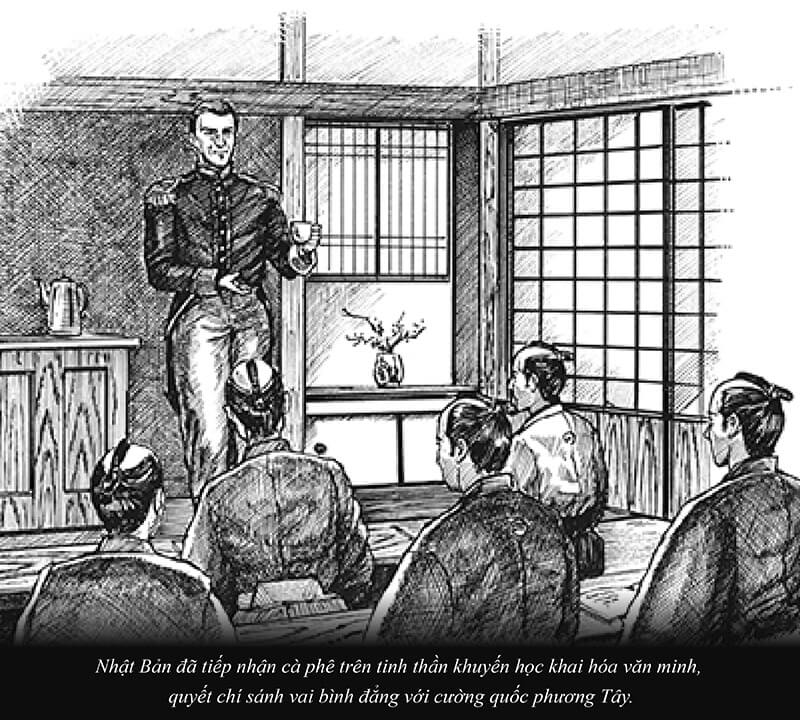
Japan has received coffee in the spirit of encouraging learning and cultivating civilization, determined to be equal to Western powers.
Under this era, Japan imposed a strict policy of seclusion for trade and diplomacy. The only Western power allowed to trade with Japan was the Netherlands. However, they were restricted to Deijima Island off the coast of Nagasaki Bay. In 1706, Dutch traders brought coffee to Japan and used it in diplomatic ceremonies. Many Dutch scholars and Japanese physicians were strongly impressed with coffee. Even the physician Yoshio Koushi (1724 – 1800) used coffee in his prescription and spread the method to his students. Thanks to that, the Japanese began to use coffee as a medicine rather than a drink.
Until 1826, doctor Philipp Franz von Siebold opened a class to teach Japanese people how to enjoy coffee, in order to bring Western coffee culture deeply into Japan. “Coffee is a medicine that is good for health and prolongs life,” says Dr. Siebold. He hoped that with this way of spreading, coffee would be easily accepted in a Shinto country. In 1897, Emperor Meiji contributed to promoting the development of coffee culture in Japan when newspapers published information that the Emperor used coffee as a daily drink.
Coffee spread comprehensively in Japan since the Meiji Restoration, the delegations of Japanese experts who traveled to Europe returned and encouraged the movement to selectively study Western civilization. Approaching the literary world of the West, the Japanese elite became more and more aware of the country’s low position in the international arena. Philosopher Fukuzawa Yukichi – who enlightened Japan’s national spirit, said that expanding diplomacy was necessary, but if the people lacked the spirit of self-control, lacked of independent will, it would lead to being dominated or influenced, and even threatened to become a colony of European and American powers.
Philosopher Fukuzawa Yukichi wrote the book An Encouragement of Learning (1872 – 1876) to awaken the Japanese nation to study, to forge the will to each individual, each person to understand their responsibility to the country’s destiny. In particular, the intelligentsia must take on the role of opening up a new academic, economic, and legal system in the embryonic period to nurture civilization. An Encouragement of Learning is also one of the 100 precious books in the “Life-changing Foundation Bookcase” by the Founder – Chairman of Trung Nguyen Legend Group, Dang Le Nguyen Vu, carefully selected and gifted to tens of millions of young people throughout Vietnam through the “Journey from the Heart – Journey of Great Will – Nation-building Start-up for 30 million young Vietnamese”, in order to provide the right knowledge base and comprehensive understanding for 30 million Vietnamese youth.
In order to cultivate civilization and improve people’s intellectual level, Japan advocated building a civic education environment. A school system was established such as Keio Gijuku University (1868), Doshisha University (1875), University of Tokyo (1877), Tokyo Academic Institute (1879), etc. In 1888, Educator Chung Yong- Kei opened the first cafe in Japan. Initially, Chung Yong-Kei planned to build a school, but because he wanted to provide an interactive academic space, he opened a cafe modeled after the French enlightenment cafe. Therefore, the Japanese have known coffee shops as a place for mass intellectual exchange.
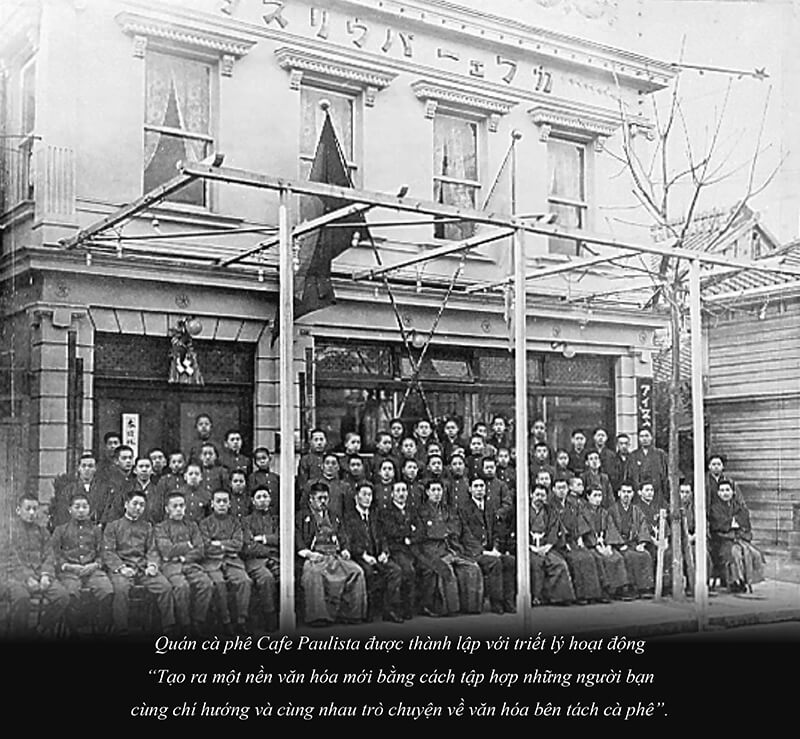
Café Paulista was established with the operating philosophy of “Creating a new culture by gathering like- minded friends and talking about culture over a cup of coffee”
In 1911, in Tokyo, three consecutive cafes, Cafe Printemps, Cafe Lion, and Cafe Paulista were established and used as a social gathering place for intellectuals. The method of organizing a learning encouraging cafe has greatly influenced the academic research life in Japan. Almost all the cultural writers of that time like Junichiro Tanizaki, Ishii Hakutei, Kotaro Takamura, Haruo Sato, Mokutaro Kinoshita, Torahiko Terada… were familiar characters of the cafe. A number of Western thinkers came together to form the group “Pan No Kai” – the society of coffee lovers. They held discussions on the reform and revival strategy of Japanese art, literature, and theater at cafes by the Sumida river.
The wave of “learning from the best” in the Western civilization brought the soul to the renovation work of the Meiji government, playing a great role in enlightening the spirit of the Japanese nation. This helped Japan quickly shape a new political institution, a new social order, a new economic system, etc., catching up with the most developed countries in the world at the time
Japanese coffee, Japanese nationalist
Japan is a country with the spirit of learning the quintessence of human culture, but absolutely not assimilated. The Japanese have a consistent belief for thousands of years that they are a special people, the children of the Sun Goddess Amaterasu. Anyone with Japanese blood must cultivate the best qualities to be worthy of their national roots and prove to the world their superiority. Every aspect of lifestyle, from the way of dressing to the way of living, is promoted to the point of uniqueness and becomes a national identity. That’s why Japan has the tea ceremony, flower ceremony, calligraphy, sword, and martial arts..
For the style of enjoying coffee, the Japanese have also made creative efforts to affirm the national trade mark. In 1899, scientist Satori Kato created a process to extract coffee by vacuum drying to produce instant coffee, kicking off the first wave of coffee. In 1960, the company UCC Ueshima Coffee launched a product of ready-to-drink canned coffee for retail stores and vending machines that were very popular. Japanese canned coffee quickly conquered the global market and achieved a Guinness World Record for the best-selling ready-to-drink coffee brand. In the 1990s, combining the method of making Drip-coffee and the art of Origami, the Japanese created Drip-bag-coffee (paper filter coffee) promoting the trend of modern coffee enjoyment.
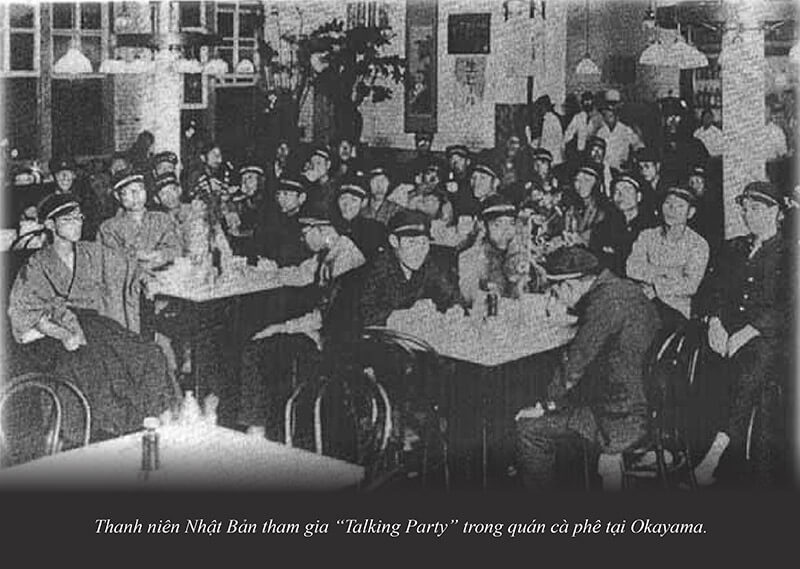
Japanese youth participate in “Talking Party” in a cafe in Okayama.
In the way of service, the Japanese apply the spirit of Omotenashi, which is understood as serving with all their heart. The reception, the care, everything is delicate and reaches the most perfection. Even so, Omotenashi is nothing like service. Stemming from deep perception about the impermanence of all things – “Mono-no-aware”, each living moment is unique. The experience of a cup of coffee is also a unique moment. Therefore, the barista would always “wholeheartedly” serve his guests from bowing to choosing ingredients, tools and preparation… Even if serving thousands of cups of coffee, each serving is a gift. A unique experience for both the customer and the barista, as if viewing this year’s cherry blossoms is not the same as experiencing last year’s cherry blossom season, even in one place.
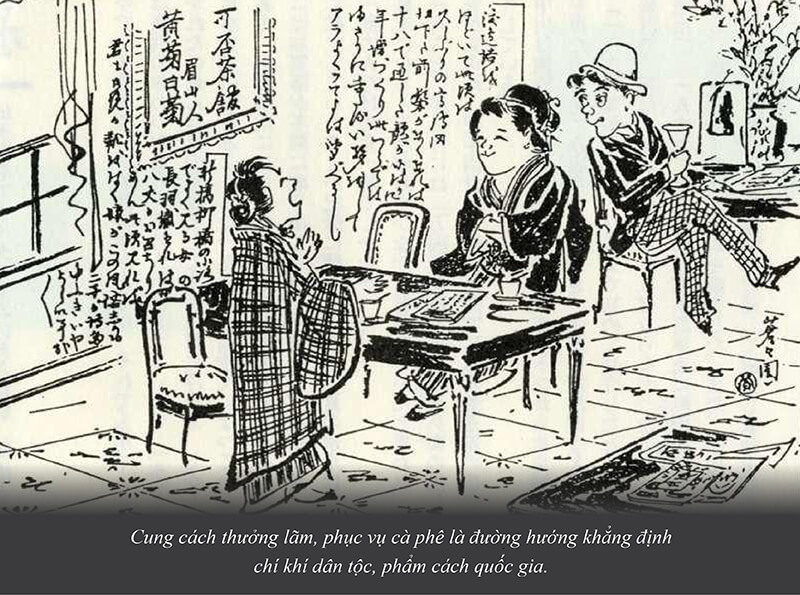
The way of enjoying and serving coffee is the way to affirm the national spirit and national dignity.
Since opening its relations with the world, Japan has always aspired to affirm the spirit of the Japanese nationalism through its efforts to learn and create. For the Japanese, the greatest dedication to humanity is to become a dignified nation with superior national qualities. In the context of the world entering the creative industry, countries competing to assert their position with the ability to wake up to creativity, Japan has also considered the creative industry as the driving force and key resource for national development. Coffee for the Japanese in the new period is an important energy. More than 70% of Japanese drink coffee every day, and currently Vietnam is the largest supplier of coffee to the Japanese market.
Famous for the tea ceremony, but Japan is always in the top of the world’s coffee consuming countries. Because for the Japanese, the spirit and the will of the nation is the starting point of all opportunities. But there is nothing better than the foundation of revitalizing the nation’s morale, such as intellectual development, learning and creativity. Coffee, which is the energy for the creative brain, is a necessary element to forge national spirit and national dignity.
In 2002, Trung Nguyen coffee shop appeared in Roppongi – the diplomatic, political and financial center of Tokyo (Japan). Trung Nguyen Coffee Shop was likened to a “mythical space” offering delicious cups of coffee from the world’s coffee powerhouse. The Japanese were willing to pay nearly twice as much as local cafes and other international brands to enjoy a cup of coffee in Trung Nguyen café. This presence was assessed by Columbia University (USA) as “a coffee shop from a developing, poor country can appear in the most expensive city in the world is proof of the global aspirations of Vietnamese brands in the period of economic renovation”.
THE REAL COFFEE
ROASTED ONLY FOR PEOPLE OF WISDOM!
Source: “The Philosophical Way of Coffee” – copyright by Trung Nguyen Legend


